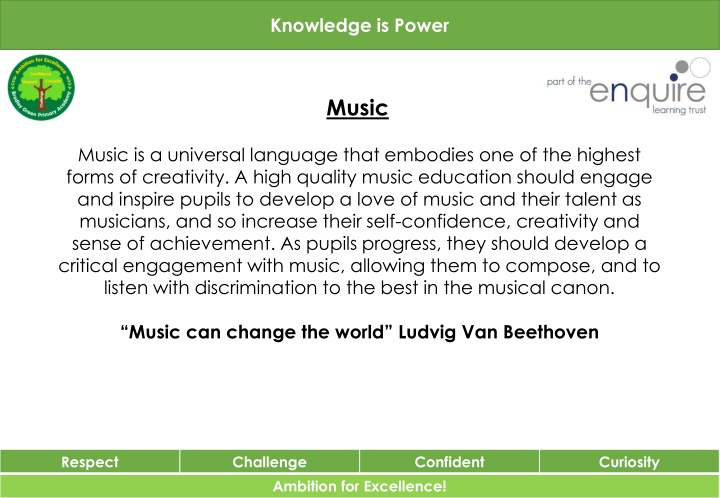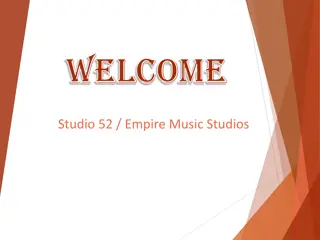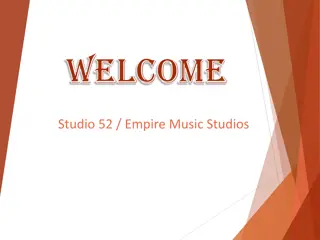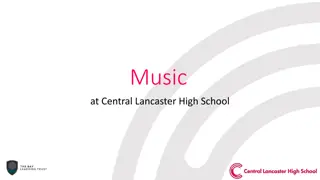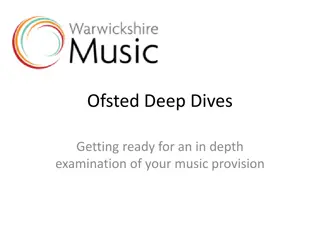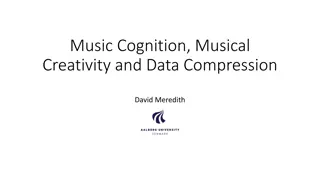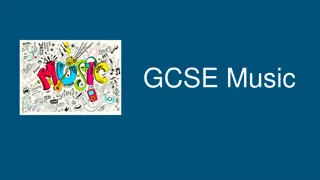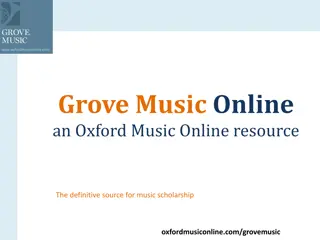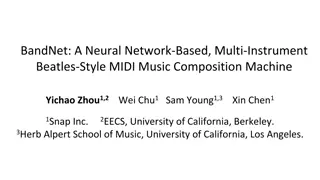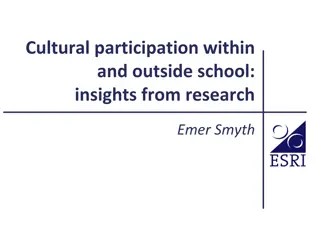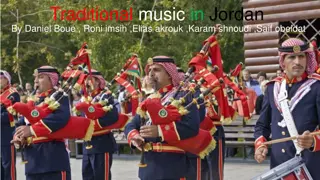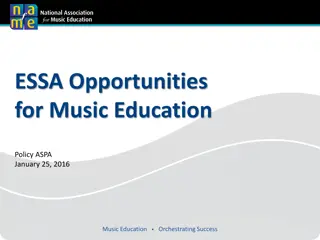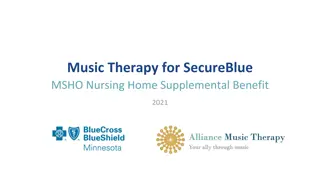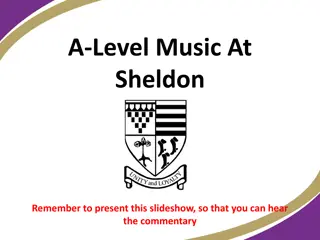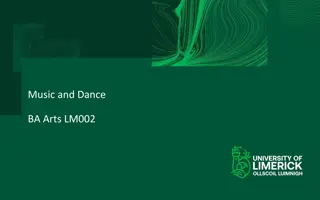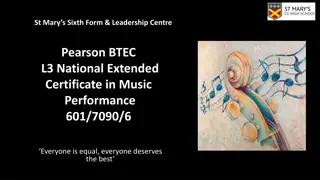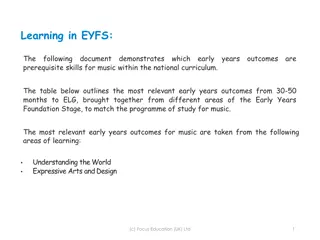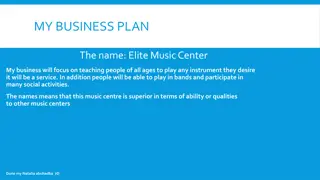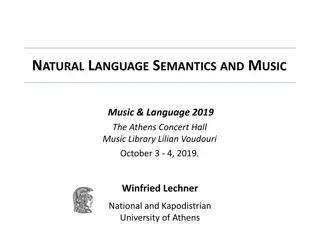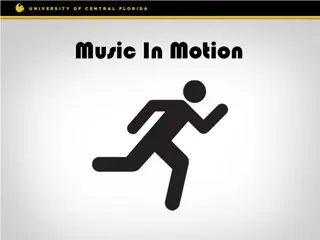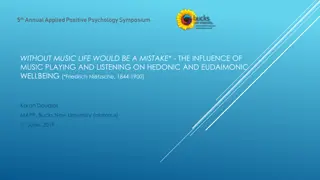The Power of Music Education for Student Development
Music education is a vital component in fostering creativity, self-confidence, and critical engagement among students. Through performance, composition, transcription, and description of music, pupils develop skills and appreciation across various genres and styles. This comprehensive approach, starting from early years to upper grades, helps students understand, create, and communicate music effectively, enhancing their overall learning experience.
Download Presentation

Please find below an Image/Link to download the presentation.
The content on the website is provided AS IS for your information and personal use only. It may not be sold, licensed, or shared on other websites without obtaining consent from the author.If you encounter any issues during the download, it is possible that the publisher has removed the file from their server.
You are allowed to download the files provided on this website for personal or commercial use, subject to the condition that they are used lawfully. All files are the property of their respective owners.
The content on the website is provided AS IS for your information and personal use only. It may not be sold, licensed, or shared on other websites without obtaining consent from the author.
E N D
Presentation Transcript
Knowledge is Power Music Music is a universal language that embodies one of the highest forms of creativity. A high quality music education should engage and inspire pupils to develop a love of music and their talent as musicians, and so increase their self-confidence, creativity and sense of achievement. As pupils progress, they should develop a critical engagement with music, allowing them to compose, and to listen with discrimination to the best in the musical canon. Music can change the world Ludvig Van Beethoven Respect Challenge Confident Curiosity Ambition for Excellence!
Knowledge is Power Music Intent Key threshold concepts Perform Pupils understand performed. Pupils will: Develop skills to perform, listen to, review and evaluate music across a range of historical periods, genres, styles and traditions, including the works of the great composers and musicians. music is created to be Compose Pupils understand that music is created through a process which has a number of techniques. Learn to sing and to use their voices, to create and compose music on their own and with others, have the opportunity to learn a musical instrument, use technology appropriately and have the opportunity to progress to the next level of musical excellence. Transcribe Pupils understand that compositions need to be understood by others and there are techniques and a language to communicate them Understand and explore how music is created, produced and communicated, including through the inter-related dimensions: pitch, duration, dynamics, tempo, timbre, texture, structure and appropriate musical notations. Describe music Pupils will appreciate the features and effectiveness of musical elements. Singing Threaded through all units and whole school Respect Challenge Confident Curiosity Ambition for Excellence!
Knowledge is Power Year Group Whole school Autumn Spring Summer EYFS A range of music styles and genres is played to children during assemblies and songs are learnt throughout the year and performed and appraised through the use of Charanga, seasonal performances and BBC 10 Pieces YEAR 1 Rhythm in the way we walk Pulse, rhythm and pitch, rapping, dancing and singing Your Imagination Singing Round and round Pulse, rhythm and pitch in different styles of music. YEAR 2 Hands feet heart South African music Zoo time I wanna play in a band singing and playing together in an ensemble. pulse, rhythm, pitch, singing and playing instruments YEAR 3 The dragon song Bringing us together Listen, appraise, compose and evaluate Let your spirit fly pulse, rhythm, pitch, singing and playing instruments Improvise, compose and evaluate YEAR 4 Mamma Mia sing, play, improvise and compose Stop Blackbird Stop! - a rap/song about bullying, singing and composing pulse, rhythm, pitch, singing and playing instruments YEAR 5 Livin on a prayer sing, play, improvise and compose, children listen and appraise other classic rock songs The fresh prince of Bel Air pulse, rhythm, pitch, singing and playing instruments Dancing in the street pulse, rhythm, pitch, singing and playing instruments YEAR 6 Happy Music and Me You got a friend pulse, rhythm, pitch, singing and playing instruments pulse, rhythm, pitch, singing and playing instruments Try out different ways of making music, exploring the work of some influential women in music Respect Challenge Confident Curiosity Ambition for Excellence!
Knowledge is Power Respect Challenge Confident Curiosity Ambition for Excellence!
Knowledge is Power How the Scheme is structured Each Unit of Work comprises the of strands of musical learning which correspond with the national curriculum for music: 1. Listening and Appraising 2. Musical Activities a. Warm-up Games b. Optional Flexible Games c. Singing d. Playing instruments e. Improvisation f. Composition 3. Performing Respect Challenge Confident Curiosity Ambition for Excellence!
Knowledge is Power National Curriculum 2014: ...listen to, review and evaluate music across a range of historical periods, genres, styles and traditions, including the works of the great composers and musicians Respect Challenge Confident Curiosity Ambition for Excellence!
